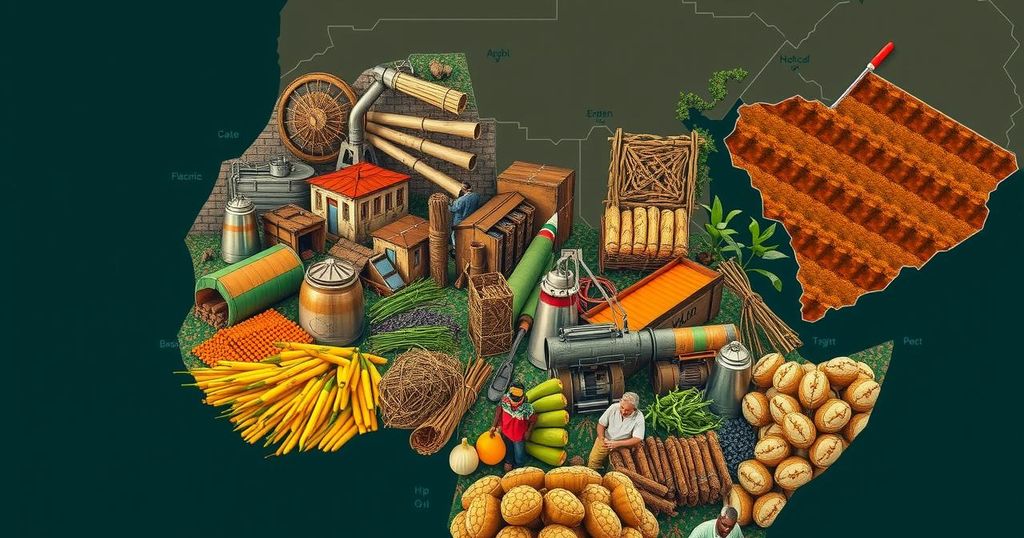Benin’s economy has historically relied on external assistance, primarily from France. Following a period of socialist policies and nationalization initiated in the 1970s, the country faced stagnation due to corruption, making subsequent liberalization efforts in the 1980s ineffective. Agriculture employs 70% of the population, focusing on staple food production, while offshore oil and various mineral resources contribute to economic activity. Trade largely revolves around agricultural exports, and transportation infrastructure remains underdeveloped yet crucial for trade growth.
Since gaining independence, Benin’s economy has heavily depended on external support, primarily from France and international organizations, which has somewhat alleviated the challenges of economic stagnation and poverty faced by a large segment of the population. The government that seized power in a 1972 coup attempted between 1975 and the early 1980s to transform the economy into a more socialist framework, largely nationalizing key sectors and reducing reliance on France while establishing partnerships with socialist countries. Despite these efforts, the anticipated improvements did not materialize, as corruption remained rampant, and the economy struggled to prosper even after a liberalization effort in the mid-1980s. Consequently, with the political changes in the early 1990s, the remnants of Marxism were discarded, leading to a renewed emphasis on privatization.
Benin’s natural resources contribute significantly to its economy, with remaining tropical forests in the southwest and central regions providing hardwoods like mahogany and teak. The aquatic ecosystems are bountiful with fish, and mineral deposits including iron ore, limestone, chromium, and gold are present. Notably, offshore oil production has been active since 1982 following its discovery in 1968 near Cotonou, bolstering energy resources for the country.
Agriculture employs approximately 70% of Benin’s workforce, emphasizing self-sufficiency in staple foods such as yams, cassava, and maize since the mid-1980s. Although formerly dominant palm oil production has declined, cotton and other cash crops, including karité and peanuts, have seen growth. The fishing sector also plays an important role, with significant catches in both lagoons and coastal waters.
Benin’s industrial landscape includes various manufacturing plants, such as palm oil processing and cement production facilities. Electricity generation is primarily thermal, supplemented by imports from Ghana, and the Mono River Dam provides hydroelectric power to both Benin and Togo, aiding in meeting energy demands.
In the financial sector, state-owned banks were liquidated in the late 20th century, paving the way for private banks and increased foreign investment to aid economic growth, with the CFA currency being backed by France. Trade is heavily reliant on agricultural exports, particularly cotton and palm oil, alongside informal trade across the Nigerian border, which poses challenges to the nation’s trade deficit. Additionally, the deepwater port of Cotonou serves as a critical asset for international trade, facilitating exchanges especially with landlocked Niger and Nigeria.
Transportation infrastructure is developed yet limited, consisting mainly of two primary paved roads leading to the coast and northward, while rail links and navigable rivers provide further connections. Cotonou is also home to the country’s sole international airport, linking Benin to various nations.
The economy of Benin has undergone significant transformations since its independence, influenced by political upheavals and economic restructurings. Initially reliant on colonial powers for sustenance, various regimes attempted to create a self-sufficient economy through nationalization and investment in agricultural sectors. Despite these efforts, persistent challenges such as corruption, inadequate infrastructure, and reliance on agriculture as the economic backbone framed Benin’s struggle towards sustainable development. With a focus on liberalization and privatization from the 1990s onward, Benin sought to reinvigorate its economy and reduce external dependency, culminating in a mixed landscape of domestic and foreign investment, diverse agricultural production, and nascent industrial development.
Benin’s economy is a complex interplay of historical dependency on foreign support, attempts at socialist restructuring, and gradual liberalization leading to privatization. While agriculture remains the backbone of its economy, with government efforts focusing on achieving self-sufficiency and expanding cash crops, significant mineral and oil resources also contribute to economic potential. Challenges such as corruption, inadequate trade balances, and infrastructural limits continue to hinder full economic transformation. Overall, with strategic investment and improved governance, Benin aims to enhance its economic position in the West African region.
Original Source: www.britannica.com







